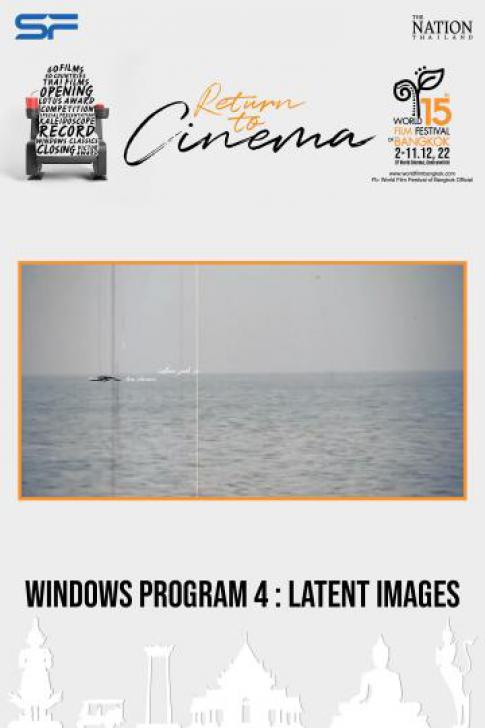
Windows Program 4 : Latent Images
หนัง Windows Program 4 : Latent Images Under the Microscope 7 นาที (ค.ศ.2022, Michaela Grill) จุดลำแสงที่หมุนเป็นเกลียว รูปทรงยืดขยายเป็นจังหวะ โครงสร้างอันขึงขัง และเฉดสีที่ประทุอย่างไร้สัณฐาน ภาพเหล่านี้ถูกบันทึกในฟุตเตจภาพยนตร์วิทยาศาสตร์ในปี 1920 ซึ่ง Michaela Grill นำมาจัดเรียงและตัดต่อใหม่สู่งานไซไฟอิเลคโทรนิค ราวกับผลงานของ Jean Painlevé แห่งยุคสมัยใหม่ Swirling dots of light, pulsating forms, rampant structures, and amorphous eruptions of colour: recordings from science films of the 1920s, which Michaela Grill rearranges to a ticking, shimmering sci-fi electro soundtrack. Parasite Family 5 นาที (ค.ศ.2022, ประพัทธ์ จิวะรังสรรค์) Parasite Family สร้างจากฟิล์มเนกาทีฟเก่าๆ ที่ตกค้างอยู่ในร้านถ่ายรูป ซึ่งปัจจุบันผู้คนไม่นิยมไปถ่ายรูปตามร้านลักษณะนี้อีกแล้วตั้งแต่มีกล้องดิจิทัล ศิลปินประพัทธ์ จิวะสังสรรค์ ได้สะสมฟิล์มเหล่านี้แล้วเติมลมหายใจให้มันมันเสียใหม่ ด้วยการพามันเดินทางจากโลกอนาล็อค สู่โลกดิจิทัล รวมทั้งฟื้นคืนชีพฟิล์มเหล่านี้ผ่านกระบวนการการใช้ AI ในการสร้างใบหน้าขึ้นมาใหม่ ภาพของผู้คนเหล่านี้ค่อยๆ หลอมรวมจนกลายพันธุ์ใหม่ เสมือนเป็นสัตว์ประหลาดที่เป็นกาฝากในสังคมไทย Parasite Family is constructed from old film negatives discovered in an out-of-business film lab. Using analog and digital editing techniques, Prapat Jiwarangsan breathes new energy into these old films. He accompanies them on their journey from the world of analog to the world of digital, and finally to the world of AI-generated images and NFT artworks. Suggesting that these faces represent a certain kind of family that is parasitic on Thai society—the kind of families and institutions that absorb wealth and power—they gradually evolve into a new species of monsters. Nazarbazi 19 min นาที (ค.ศ.2022, Maryam Tafakory) Nazarbazi [ละครแห่งการชายตา] เป็นงานแห่งความรักและความลุ่มหลงอันปรากฏบนภาพยนตร์อิหร่าน ซึ่งการแสดงออกถึงความเสน่หาระหว่างชายหญิงเป็นเรื่องต้องห้ามบนจอภาพยนตร์หลังการปฏิวัติอิหร่านในปี 1979 Nazarbazi [the play of glances] is a film about love and desire in Iranian cinema where depictions of intimacy and touch between women and men are prohibited. One Thousand and One Attempts to be an Ocean 12 นาที (ค.ศ.2021, Wang Yuyan) สะท้อนภาพยุคสมัยของกระแสธารแห่งข้อมูล ที่ผู้คนสูญเสียความสามารถในการทำความเข้าใจต่อโลกอย่างลึกซึ้ง ประกอบสร้างขึ้นจากเหล่า “วิดีโอชวนฟิน” จากเหตุการณ์กระจ้อยร่อยที่ไหลหลากอยู่บนอินเตอร์เน็ต เผยโฉมเรื่องเล่าสุดพิลึกที่เคยถูกเก็บซ่อนอยู่ภายใต้ภาพอันธรรมดาสามัญ One Thousand and One Attempts to Be an Ocean เป็นดั่งความปรารถนาของมนุษย์ต่อกระแสข้อมูลไร้มูลเหตุที่ผสานกับเอนโทรปีแห่งยุคสมัยแห่งคลื่นข้อมูล One Thousand and One Attempts to Be an Ocean reflects on the experience of not being able to see the world with depth perception. Made up of micro- events from “satisfying video” that swarm on the internet, the abstract narrative unfolds through an appropriation way by referring to trance and minimal music. Glass Life 19 นาที (ค.ศ.2021, Sara Cwynar) Glass Life เปรียบเสมือนโครงร่างเคลื่อนไหวของภาพนิ่งและภาพเคลื่อนไหวที่ถูกเก็บไว้ในฮาร์ดไดรฟ์ของศิลปินมาเนิ่นนาน Sara Cwynar ประกอบร่างความสัมพันธ์ระหว่างความทรงจำส่วนตัวกับโลกภายนอกผ่านเครื่องคอมพิวเตอร์และเครื่องมือในสตูดิโอ สร้างสรรค์ออกมาเป็นผลงานที่พาเราไปสำรวจโลกเสมือนของลัทธิบริโภคนิยม Glass Life is a dynamic configuration of images and video accumulated over the years on the artist’s hard drives. From her studio, the artist uses her computer and various studio set-ups to make sense of her visual archive – and the world outside. Luscious pictures of food, political figures, screen idols, sportswomen, Instagram models, grand artworks, cartoon characters, emojis and self-portraits, among many other images, vie for our attention. A dizzying navigation through our consumerist visual world. What Rules the Invisible 10 นาที (ค.ศ.2022, Tiffany Sia) ศิลปิน Tiffany Sia มองย้อนกลับสู่ประวัติศาสตร์การเป็นเมืองขึ้นอันซับซ้อนของฮ่องกง ผ่านฟุตเตจหนังบ้านเรื่องราวของครอบครัวและภาพของฮ่องกงที่บันทึกผ่านสายตาแม่ของเธอ What Rules the Invisible หยิบยืมและตีความใหม่ให้กับหนังบ้านในฐานะของภาพของการเฝ้ามอง ซึ่งเปิดเผยถึงความแตกแยกและเศษซากของการต่อสู้ในอดีตที่ถูกหลงลืมจากกรอบเลนส์การบันทึก Through archival travelogue footage of Hong Kong and family stories from her mother, Tiffany Sia explores Hong Kong’s tangled colonial histories in What Rules the Invisible. Appropriating and reframing the home movies’ voyeuristic images, the filmmaker finds small disruptions, returned gazes, and the ghostly residue of past resistance left undocumented. (NYFF)





